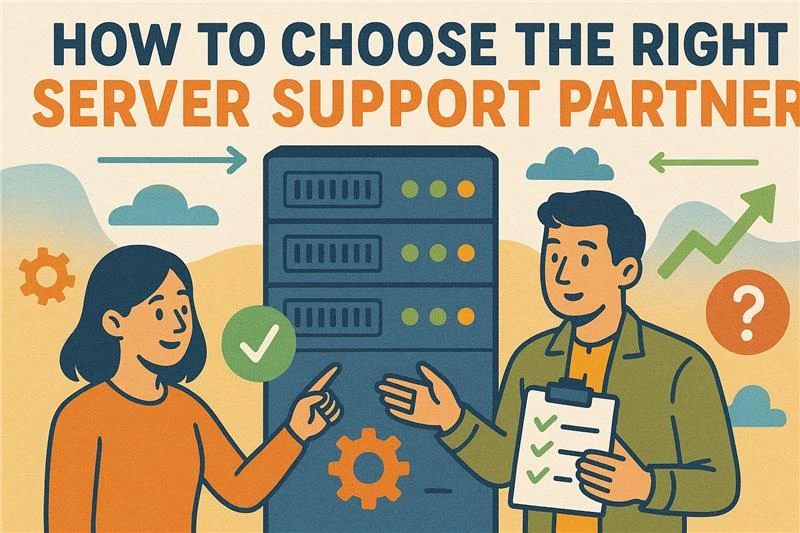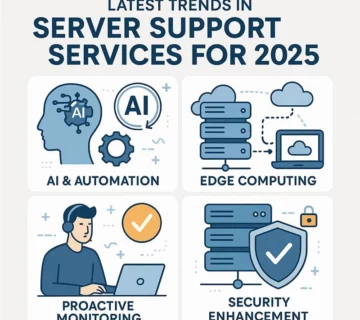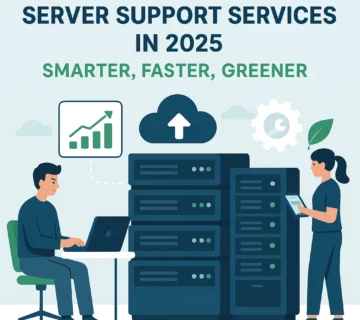How to Choose the Right Server Support Partner | Expert Guide 2025

Servers are the backbone of today’s online companies. They support applications, store confidential data, and keep things running. But if they are not supported, servers become the cause of downtime, inefficiencies, and even safety risks in no time. That’s why the majority of organizations approach professional Server Support Services vendors. The issue? Not every partner is equal. The wrong decision can be a risk of paying for inferior service, unexpected fees, or worse yet flaky help when you need it most. In this blog, we’re going to break down how to evaluate and make the proper server supports partner selection for your organization.
Why the Right Partner Matters
Servers don’t just run IT systems they run your business. Whether you’re in healthcare, finance, retail, or manufacturing, downtime or compromised data can be catastrophic. Having a partner who understands your industry, your infrastructure, and your long-term goals ensures you’re not just reacting to problems but preventing them.
The right partner helps you:
- Reduce downtime and increase productivity.
- Strengthen security against evolving threats.
- Scale your infrastructure as your business grows.
- Stay in line with industry regulations.
- Save money by optimizing resources.
Key Areas to Analyze
Here’s a list of the top areas to analyze when selecting a provider of Server Support Services.
1. Expertise and Experience
Seek a partner with established experience in server technologies applicable to your infrastructure. Do they have expertise in Windows, Linux, cloud, hybrid, or edge? Do they support hardware and software challenges?
Request:
Case studies within your vertical.
Certifications (e.g., Microsoft, VMware, Cisco).
References from similar nature companies.
2. Availability and Response Time
Servers don’t sleep, and neither should your support firm. A good provider offers 24×7 monitoring and rapid response to problems.
Ensure they offer guaranteed SLAs (Service Level Agreements).
Get information about average response times.
Ensure they offer both remote and on-site support as and when needed.
3. Proactive vs. Reactive Support
The best server support is not merely about fixing when it breaks. It’s about preventing breakage in the first place.
Do they include proactive monitoring with notifications?
Are they using predictive analytics and AI to anticipate problems?
Do they offer regular performance reports and recommendations?
4. Security and Compliance
Security cannot be an afterthought in an era of ransomware, phishing, and insider attacks. Your server support business should have security as part of their DNA.
Do they have patch management and vulnerability testing in place?
Can they help with compliance requirements like HIPAA, PCI-DSS, or GDPR?
Do they have well-defined incident response procedures?
5. Scalability and Flexibility
Your needs today will be different from tomorrow. The partner you choose should grow with you.
Do they have the ability to do cloud migrations, hybrid configurations, or edge deployments?
Do they offer flexible pricing and services packages?
Are they able to scale support quickly during periods of seasonal or unexpected demand?
6. Transparency and Communication
Communication is key in any relationship. Look for a partner who values openness.
Do they provide regular health reports on your servers?
Are costs, fees, and services clearly explained?
Will you be given an account manager or a single point of contact?
7. Reputation and Reviews
Reputation counts. A partner who has consistently performed for others will more likely perform for you.
Read customer testimonials and reviews.
Look. Work. Perform their reputation on industry websites such as Gartner or G2.
Request references and then follow up.
Red Flags to Be Watchful Of
When selecting server supports providers, be careful of:
Ambiguous SLAs — vague assurances generally mean minimal obligation.
Overpromising — if it sounds too good to be true, chances are it is.
Hidden charges — surprise bills for “extra” services can add up fast.
Restricted support hours — vendors with limited actual 24/7 availability can leave you vulnerable.
One-size-fits-all packages — your company requires customized solutions, not pre-fab packages.
Steps to Choosing the Right Partner
Assess Your Needs
Inventory your current servers (on-premises, cloud, hybrid).
List your pain points: downtime, security vulnerabilities, slow response times.
List your must-haves (e.g., compliance, 24/7 support).
Shortlist Providers
Research providers with specific industry expertise.
Look for providers offering tailored Server Support Services rather than generic IT services.
Request Proposals and Compare
Study SLAs, pricing models, and scope of services.
Compare their reporting, monitoring, and escalation procedures.
Check References and Case Studies
Speak to current clients directly.
Seek reduces downtime, improves performance, and fortifies security.
Pilot or Trial Period
Start with a smaller project before committing long-term.
Test responsiveness, communication, and performance.
The ROI of a Solid Partnership
Cost is always a factor, but the best server support partner delivers ROI in:
- Reducing expensive downtime.
- Preventing expensive security breaches.
- Improving efficiency and productivity.
- Helping avoid fines for compliance infractions.
- Providing peace of mind so your team can keep growing.
A good Server Support Services partner is not an expense it’s an investment in your business’s stability and success.
Conclusion
Choosing the right server support partner is more than just keeping servers up. It’s about having a partner who understands your business, looks forward to how you will grow, and grows with you. Through thinking about expertise, security, scalability, and transparency, you can build a relationship that generates long-term value. The bad partner can cost you time, money, and reputation. The good one will make your servers and your company thrive.




No comment